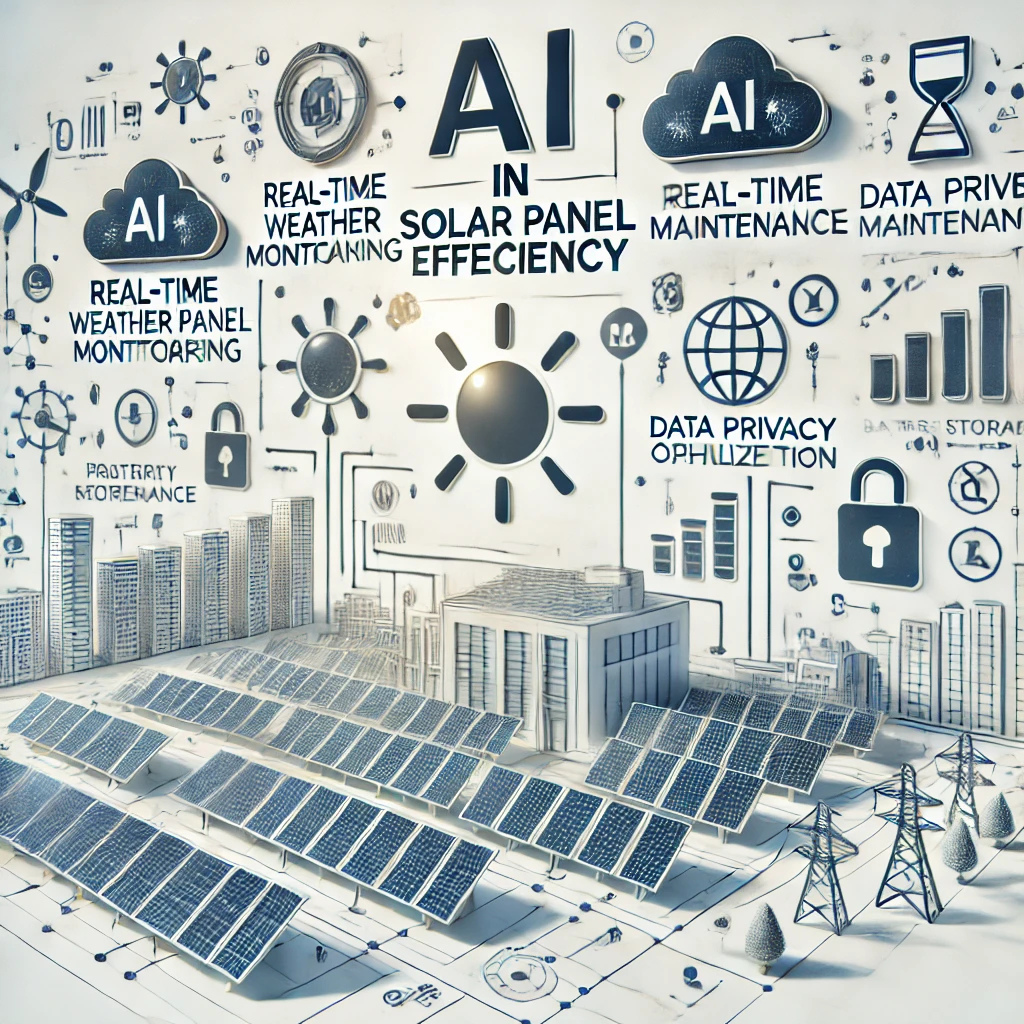Advancements in Renewable Energy Systems: Optimizing Solar Panel Efficiency with AI
1. Introduction
Imagine a bustling city in the heart of summer, where intense sunlight fuels a massive demand for electricity as air conditioners whir and electric cars charge in every garage. The local power grid, heavily reliant on solar energy, works hard to meet the surge. Suddenly, clouds roll in, shading solar panels across the city. In the past, such fluctuations would lead to sudden drops in energy production, forcing reliance on backup fossil-fuel sources and causing abrupt power outages. But thanks to advances in artificial intelligence (AI), this city has a very different outcome.
The city’s renewable energy system is equipped with AI-powered software that monitors weather patterns, anticipates cloud cover, and adjusts energy reserves in real time. As the clouds move in, the system redirects power stored in batteries, seamlessly filling in the gaps without disruption. Simultaneously, AI algorithms analyze panel performance data, identifying and prioritizing any that need cleaning or maintenance to maximize efficiency. The entire operation happens automatically, sparing engineers the frantic rush to correct drops in energy.
This scenario illustrates AI's transformative potential in optimizing renewable energy systems (RES), particularly solar power. Over the years, researchers have delved into AI techniques that enhance various RES aspects, from predictive maintenance to resource assessment (Liao et al., 2024; Mridha et al., 2021).

1.1 Challenges and Implementation of AI in Optimizing Solar Panel Efficiency
Artificial Intelligence (AI) has the potential to significantly enhance the efficiency and effectiveness of renewable energy systems, particularly in solar energy optimization. However, despite its promise, several challenges complicate the application of AI in this domain. From data privacy concerns to regulatory obstacles, these issues present hurdles that need careful consideration to realize the full potential of AI in solar energy.
1.1.1 Data Privacy and Security Concerns
One of the most critical challenges in AI-driven solar energy optimization involves data privacy and security. Solar energy systems, especially in smart buildings or industrial settings, rely on a wealth of data—ranging from energy consumption patterns to performance metrics of individual panels. This data is often sensitive, and unauthorized access or misuse could lead to confidentiality breaches and even sabotage. AI systems that use this data for optimization are susceptible to cyber-attacks, raising concerns about system integrity and reliability (Dong et al., 2019; Farzaneh et al., 2021). Safeguarding this data involves implementing rigorous cyber security measures, which can be both technically complex and costly. Additionally, adhering to data privacy regulations like the GDPR in Europe or the CCPA in the United States adds another layer of difficulty, requiring organizations to manage data handling carefully to avoid legal repercussions (Jia et al., 2019).
1.1.2 Complexity of AI Implementation and Integration
Implementing AI in solar energy systems requires expertise in both AI technologies and energy management, a combination that can be challenging to source. This complexity is heightened in larger-scale environments, such as industrial plants and smart cities, where integrating AI into existing infrastructure demands technical sophistication. High-quality, real-time data is essential for AI algorithms to function effectively, as inaccuracies or inconsistencies in data can lead to suboptimal performance (Raval et al., 2021; Sha et al., 2019). Furthermore, ensuring that data is reliable and readily available in a scalable manner can be challenging, especially in remote or less technologically advanced regions. Integrating AI solutions also involves substantial investments in computational, financial, and human resources, which may be beyond the reach of smaller organizations with limited budgets (Zhao et al., 2019)
1.1.3 Regulatory and Policy Challenges
The lack of clear guidelines or standards for AI applications in renewable energy can slow down the adoption of these technologies, as organizations remain hesitant without a defined regulatory framework (Olde et al., 2024). Moreover, policies that favor traditional energy sources through subsidies or incentives can also act as barriers, discouraging investments in AI-enhanced solar energy systems. Addressing these policy challenges requires collaboration across governmental, industrial, and academic institutions to establish supportive regulations that encourage innovation (Gajdzik et al., 2023; Liu et al., 2023)
1.2 Benefits of AI in Energy Efficiency Optimization
Artificial Intelligence (AI) is revolutionizing renewable energy by enabling efficient and sustainable management practices, particularly in solar panel optimization. Key benefits of AI include enhanced accuracy in energy demand prediction, real-time monitoring, and control, which allow dynamic adjustments based on factors like weather or occupancy patterns. AI also aids in integrating renewable energy sources and supporting demand response programs, maximizing energy efficiency and resilience (Agostinelli et al., 2021; Aguilar et al., 2021; Mishra & Singh, 2023)

2. Conclusion
In conclusion, artificial intelligence (AI) holds transformative potential for enhancing the efficiency, sustainability, and reliability of renewable energy systems, especially in solar energy optimization. By leveraging AI, cities and industries can address some of the most pressing energy challenges, such as fluctuating solar output and peak demand, with real-time responsiveness. AI enables more precise energy demand prediction, dynamic system control, and seamless integration of renewable energy sources, supporting a resilient and adaptable power infrastructure. However, to fully harness these benefits, it is essential to address the associated challenges—data privacy, security, technical complexity, and regulatory uncertainties.
Data privacy and cyber security are critical as energy systems rely on sensitive information for optimization, demanding robust protective measures. Moreover, the complexity of AI implementation and the evolving regulatory landscape require strategic investment, clear policy frameworks, and cross-sector collaboration. By overcoming these challenges, the energy sector can unlock AI’s full potential to drive widespread adoption and innovation in renewable energy. Ultimately, AI-driven optimization has the potential to not only improve solar panel efficiency but also to contribute significantly to global sustainability goals, paving the way for a future where AI and renewable energy systems work seamlessly together to provide clean, reliable power.